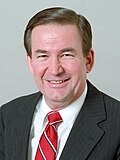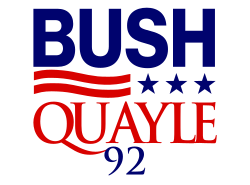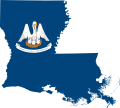Top Qs
Timeline
Chat
Perspective
1992 Republican Party presidential primaries
Selection of Republican US presidential candidate From Wikipedia, the free encyclopedia
Remove ads
The 1992 Republican Party presidential primaries were the presidential primaries and caucuses of the Republican Party, which took place in all 50 U.S. states and Washington, D.C., between February 18 to June 9, 1992, in which voters selected 2,277 delegates sent to the Republican National Convention, held in Houston, Texas, between August 17 and August 20, 1992. At the convention, Republican delegates nominated George H. W. Bush, the incumbent U.S. president, as the Republican Party's presidential nominee, and Dan Quayle, the incumbent vice president, as his vice presidential running mate.
In the presidential election held November 3, 1992, Bush and Quayle were defeated by Democrat presidential nominee Bill Clinton and Al Gore, his vice presidential running mate.
Remove ads
Primary race overview
Summarize
Perspective
President George H. W. Bush was challenged for the Republican nomination by Pat Buchanan, a conservative author and commentator. During early counting in the New Hampshire primary, it appeared that the president might actually lose. However, Buchanan faded by the end of the evening, and Bush won the rest of the primaries. Bush's margins in many of the primaries were not as large as expected, and led to the rise of Ross Perot as an independent candidate.
Republican Louisiana State Representative and former Ku Klux Klan leader David Duke also ran in a number of primaries, but he did not receive any delegates. Former Governor Harold Stassen of Minnesota also made a quixotic bid for support in the Minnesota primary, winning enough votes to entitle him to one delegate, but was later denied his single vote by machinations at the Minnesota Republican Party's 1992 state convention.
New Hampshire primary
As Buchanan's candidacy relied heavily on a strong showing in the New Hampshire primary, President Bush made New Hampshire a focal point in his reelection bid. However, New Hampshire still remained a pivotal base for Buchanan's primary campaign.
Because Bush was widely perceived to have broken his "read my lips" pledge, Buchanan found support in the economically battered and conservative state of New Hampshire. Making Bush's tax-hikes a central theme of his campaign, Buchanan enjoyed healthy grass-roots support despite lagging behind the president in pre-primary polling.
Bush countered the threat posed by Buchanan by touring New Hampshire himself. He memorably told an audience at an Exeter town hall: "Message: I care".[2] Some sources claim that this was the result of Bush mistakenly reading a cue card aloud.[3]
On primary night, President Bush carried New Hampshire with 53% of the vote. Buchanan finished second with 38% of the vote.[4]
The rest of the race
Despite many in the Bush campaign attempting to push Buchanan out of the race, the strong showing made the Buchanan campaign hope for an outpouring of campaign contributions which galvanized the campaign into making efforts to pull out strong showings such as in the Georgia primary.
Despite an impressive showing, Buchanan's campaign never attracted serious opposition to President Bush in most contests. Most of Buchanan's "victories" were larger-than-expected showings that were still considered landslide Bush wins by most of the media. Still, the fact that Buchanan received more than two million votes nationwide prognosticated trouble for Bush in the general election.
Remove ads
Candidates
Summarize
Perspective
Nominee
Other candidates
Campaign finance
Declined
- Former Governor Pete du Pont of Delaware[9]
Remove ads
Results
Summarize
Perspective
Source[10]
Nationwide
Popular vote result:[23]
- George H. W. Bush (inc.) - 9,199,463 (72.84%)
- Pat Buchanan - 2,899,488 (22.96%)
- Unpledged delegates - 287,383 (2.28%)
- David Duke - 119,115 (0.94%)
- Ross Perot - 56,136 (0.44%)
- Pat Paulsen - 10,984 (0.09%)
- Maurice Horton - 9,637 (0.08%)
- Harold Stassen - 8,099 (0.06%)
- Jack Fellure - 6,296 (0.05%)
Remove ads
Endorsements
Pat Buchanan
- Brendan Eich, computer programmer and co-founder/CEO of Mozilla[24][25]
See also
Notes
Remove ads
References
Wikiwand - on
Seamless Wikipedia browsing. On steroids.
Remove ads

















